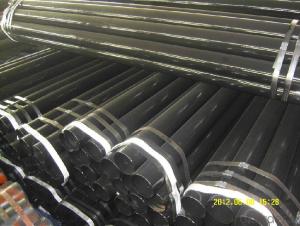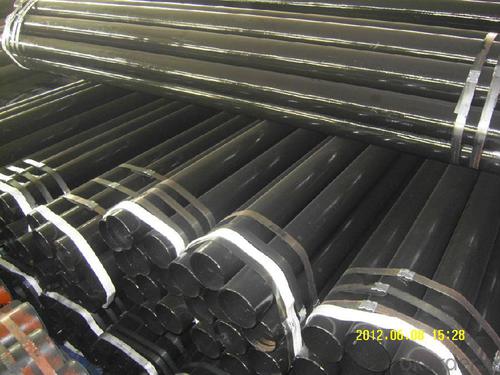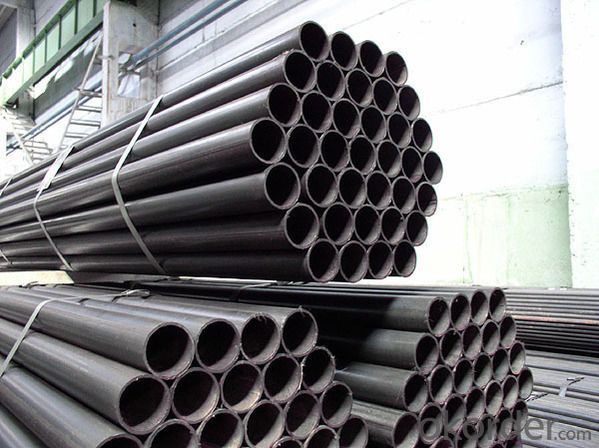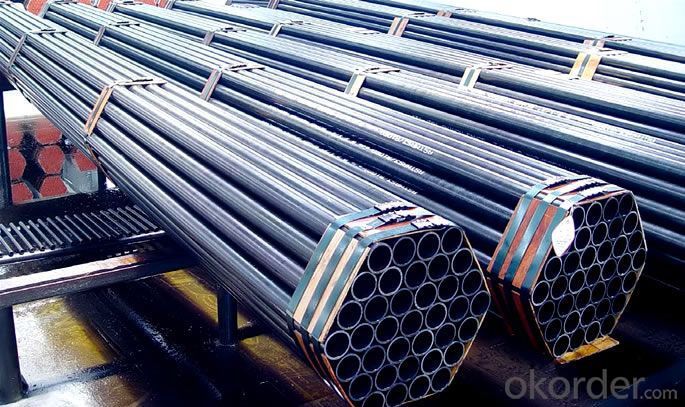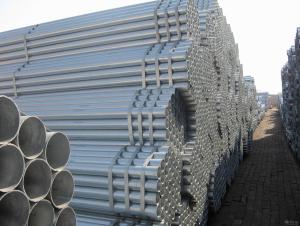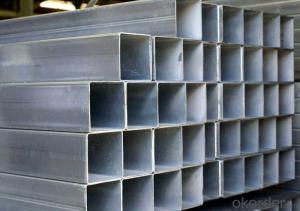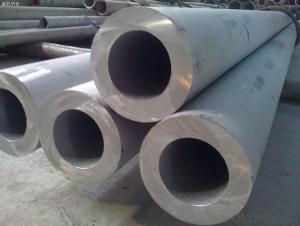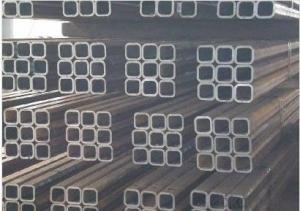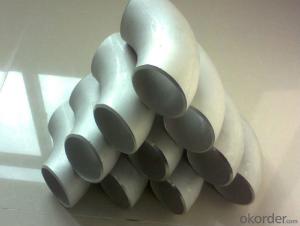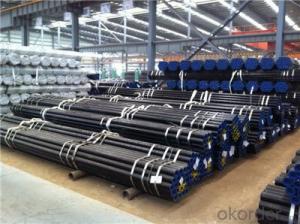Seamless Steel Pipe from okorder.com of CNBM
- Loading Port:
- Tianjin
- Payment Terms:
- TT OR LC
- Min Order Qty:
- 100 m.t.
- Supply Capability:
- 3000 m.t./month
OKorder Service Pledge
OKorder Financial Service
You Might Also Like
Product Description:
1、Structure of Seamless Steel Pipe Description:
A large amount of Seamless Steel Pipes is offered to the clients at cost effective rates. These pipes are extremely durable, resistant to corrosion and have high tensile strength. Our pipes are used in nuclear plants, power plants, refineries and construction industry across the country. Furthermore, we are capable of providing these seamless pipes to the clients in bulk quantity.
2、Main Features of the Steel Pipe:
• High manufacturing accuracy
• High strength
• Small inertia resistance
• Strong heat dissipation ability
• Good visual effect
•Reasonable price
3、Seamless Steel Pipe Images:
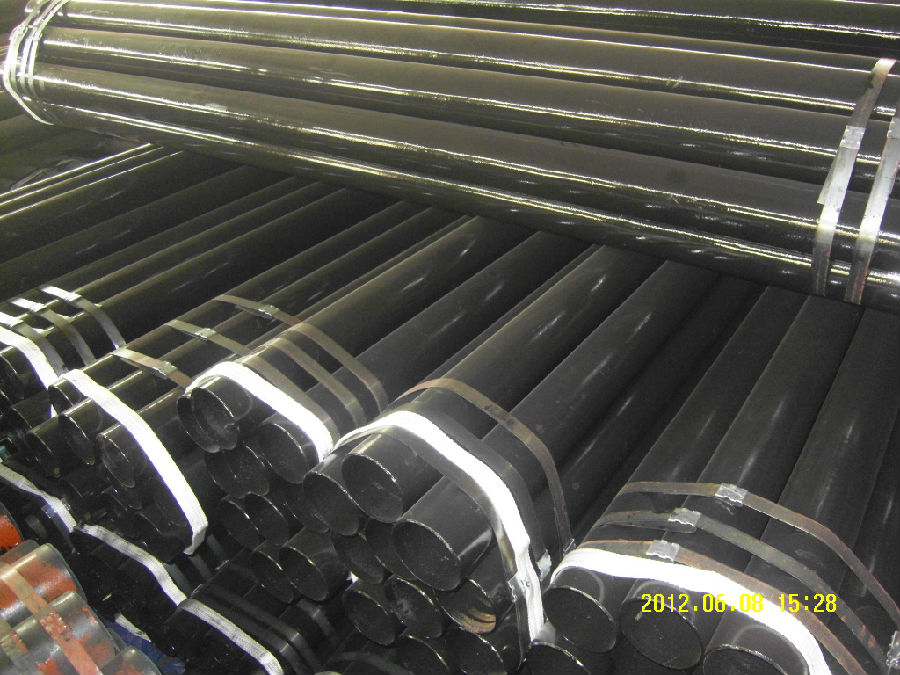
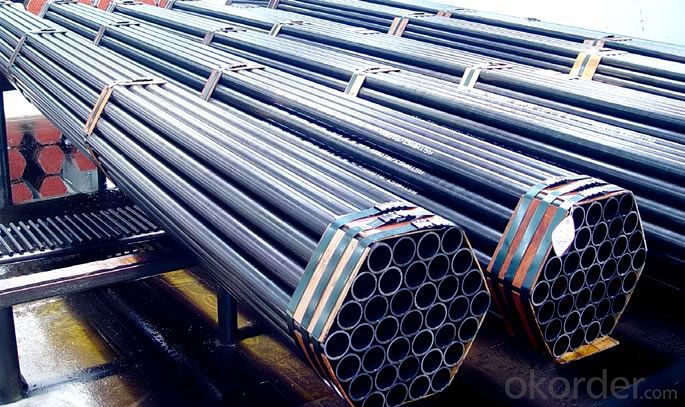
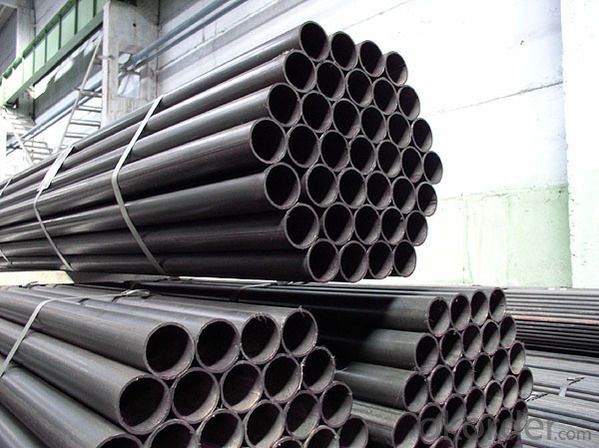
Packaging & Delivery
| Packaging Details: | Seaworthy packages, bundles wrapped with strong steel strip |
| Delivery Detail: | 15-30 days after received 30% TT |
4、Seamless Steel Pipe Specification:
| Standard: | GB, DIN, ASTM,ASME, ASTM A106-2006, ASTM A53-2007 |
| Grade: | 10#-45#, 16Mn 10#, 20#, 45#, 16Mn |
Thickness: | 8 - 33 mm |
| Section Shape: | Round |
| Outer Diameter: | 133 - 219 mm |
| Place of Origin: | Shandong, China (Mainland) |
| Secondary Or Not: | Non-secondary |
| Application: | Hydraulic Pipe |
| Technique: | Cold Drawn |
| Certification: | API |
| Surface Treatment: | factory state or painted black |
| Special Pipe: | API Pipe |
| Alloy Or Not: | Non-alloy |
| Length: | 5-12M |
| Outer Diameter: | 21.3-610mm |
5、FAQ of Seamless steel pipe:
①How is the quality of your products?
Our products are manufactured strictly according to national and internaional standard, and we take a test
on every pipe before delivered out. If you want see our quality certifications and all kinds of testing report, please just ask us for it.
Guaranteed: If products’ quality don’t accord to discription as we give or the promise before you place order, we promise 100% refund.
②How about price?
Yes, we are factory and be able to give you lowest price below market one, and we have a policy that “ for saving time and absolutely honest business attitude, we quote as lowest as possible for any customer, and discount can be given according to quantity”,if you like bargain and factory price is not low enough as you think, just don’t waste your time.Please trust the quotation we would give you, it is professional one.
③Why should you chose us?
Chose happens because of quality, then price, We can give you both.Additionally, we can also offer professional products inquiry, products knowledge train(for agents), smooth goods delivery, exellent customer solution proposals.Our service formula: good quality+good price+good service=customer’s trust.
SGS test is available, customer inspection before shipping is welcome, third party inspection is no problem.
Any question, pls feel free to contact us !
- Q: What is the role of steel pipes in the telecommunications industry?
- Steel pipes play a crucial role in the telecommunications industry as they are used for the installation of underground and overhead telecommunication cables. These pipes provide protection and support to the cables, ensuring their safety and longevity. Additionally, steel pipes are also used in the construction of communication towers and infrastructure, making them an essential component in establishing and maintaining reliable telecommunications networks.
- Q: How do steel pipes handle ground settlement?
- One possible alternative: Due to their robustness and durability, steel pipes are highly suitable for managing ground settlement. The pipes' flexibility and strength enable them to endure the shifting and settling of the ground with minimal damage. Their high resistance to deformation ensures that they can maintain their shape and structural integrity even when the ground settles or moves. When the ground settles, steel pipes can flex and bend slightly to accommodate the movement. This flexibility allows them to adapt to changes in the ground without experiencing breakage or cracking. Additionally, steel pipes often incorporate joints designed to absorb and distribute stress caused by ground settlement. Moreover, steel pipes possess a smooth interior surface that reduces friction and resistance to material flow. This characteristic becomes particularly crucial when the ground settles, as it diminishes the chances of blockages or clogs due to debris or sediment settling inside the pipes. In conclusion, steel pipes possess the necessary strength, flexibility, and resistance to deformation to effectively handle ground settlement. They can adapt to ground movement without compromising their structural integrity, making them a dependable choice for various applications such as underground infrastructure and pipeline systems.
- Q: What are the common applications of steel pipes in the oil and gas industry?
- Steel pipes are commonly used in the oil and gas industry for various applications such as drilling, production, transportation, and distribution of oil and gas. They are utilized for casing and tubing in oil wells, conveying fluids in pipelines, and supporting infrastructure for refineries and processing plants. Additionally, steel pipes are crucial for offshore drilling operations and are employed in the construction of platforms and subsea pipelines.
- Q: How are steel pipes classified according to their wall thickness?
- Steel pipes are classified according to their wall thickness into various categories such as standard, extra strong, and double extra strong.
- Q: How are steel pipes resistant to corrosion?
- Steel pipes are resistant to corrosion due to a combination of factors. Firstly, steel pipes are often coated with a protective layer, such as zinc or epoxy, which acts as a barrier between the steel and the surrounding environment. This coating prevents moisture and other corrosive substances from coming into contact with the steel, reducing the chances of corrosion. Additionally, the composition of steel itself plays a role in its corrosion resistance. Steel is primarily made up of iron, with small amounts of other elements added to enhance its strength and durability. These elements, such as chromium and nickel, create a protective oxide layer on the surface of the steel. This oxide layer acts as a natural barrier, preventing the underlying steel from being exposed to moisture and oxygen, which are key contributors to corrosion. Furthermore, steel pipes can be treated through a process called galvanization, where a layer of zinc is applied to the surface. This zinc coating provides an extra layer of protection against corrosion, as zinc is highly resistant to rust and oxidation. The zinc sacrificially corrodes instead of the steel, further extending the lifespan of the pipe. Overall, the combination of protective coatings, the composition of steel, and galvanization processes all contribute to the corrosion resistance of steel pipes. This makes them highly durable and suitable for various applications, including plumbing, construction, and transportation of fluids and gases.
- Q: How big is the seamless steel tube of DN50?
- Domestic steel pipe diameter is generally divided into A series and B series, DN50 pipe diameter of 60mm and 57mm respectively, the wall thickness should be based on your design pressure, temperature, pipe material to calculate.
- Q: What is the difference between ERW (Electric Resistance Welded) and LSAW (Longitudinal Submerged Arc Welded) steel pipes?
- ERW (Electric Resistance Welded) steel pipes are manufactured by passing an electric current through the steel strip or plate to generate heat, which results in the fusion of the edges together to form a pipe. On the other hand, LSAW (Longitudinal Submerged Arc Welded) steel pipes are produced by submerging the steel plate or strip into a molten bath of welding flux and then initiating the welding process. The main difference between ERW and LSAW steel pipes lies in their manufacturing processes and the resulting pipe structure. ERW pipes have a longitudinal seam along their length, created by the fusion of the edges, while LSAW pipes have a single longitudinal seam that is formed by the submerged arc welding process. This difference in welding techniques gives LSAW pipes a higher degree of dimensional accuracy and stability, making them suitable for applications that require precise measurements and strong structural integrity. Additionally, LSAW pipes have a larger diameter range and can be produced in larger sizes compared to ERW pipes. This makes LSAW pipes well-suited for conveying large volumes of fluid or gas, such as in oil and gas pipelines. Conversely, ERW pipes are commonly used in applications that require smaller sizes and lower pressure requirements, such as water supply systems or structural applications. In summary, the main differences between ERW and LSAW steel pipes lie in their manufacturing processes, resulting pipe structure, size capabilities, and applications.
- Q: How are steel pipes used in the automotive exhaust systems?
- Steel pipes are commonly used in automotive exhaust systems because steel is a durable and heat-resistant material. Steel pipes are used to transport the exhaust gases from the engine to the muffler and tailpipe, ensuring that the gases are safely and efficiently expelled from the vehicle. These pipes are designed to withstand high temperatures, corrosion, and vibration, making them an essential component in the exhaust system.
- Q: What type of steel pipe for security windows?
- General anti-theft window through the round tube is 3 cm square tube, 22.5 mm diameter round tube, also can use all square tube to do, if you want to median 304, the pipe is estimated more expensive, the market to do the price in 60 to 110 range. As for plastic steel, Anhui conch brand, the price of 180 this way. Aluminum alloy 110 to 230 specific look what material?!
- Q: What is the lifespan of galvanized steel pipes?
- The lifespan of galvanized steel pipes can vary depending on various factors such as the environment, usage, and maintenance. However, on average, galvanized steel pipes can last between 40 to 70 years.
Send your message to us
Seamless Steel Pipe from okorder.com of CNBM
- Loading Port:
- Tianjin
- Payment Terms:
- TT OR LC
- Min Order Qty:
- 100 m.t.
- Supply Capability:
- 3000 m.t./month
OKorder Service Pledge
OKorder Financial Service
Similar products
Hot products
Hot Searches
Related keywords
